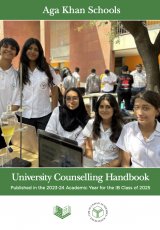Aga Khan Academies Celebrate Graduating 1,000 Global Leaders
Hyderabad, India and Mombasa, Kenya, 25 May 2019 - At graduations in India and Kenya, 159 exceptional students joined other alumni in marking the milestone of the 1000th leader to graduate from the Aga Khan Academy Hyderabad (India) and its sister school, the Aga Khan Academy Mombasa (Kenya).
One key mission of the Aga Khan Academies programme is to create ethical leaders who work towards a shared goal of improving the lives of people in their own countries and across the globe. The Academies work to create a learning community that is exceptionally diverse, open-minded, culturally rooted and driven to make a positive impact, placing great importance on identifying and nurturing exceptional young people from a wide range of nationalities, religions, and ethnic and socio-economic backgrounds.
Salim Bhatia, Director of Academies, addressed the graduating cohort as “beacons of hope,” those who are “putting into practice what you have learned as members of the Aga Khan Academies about the values we hold dear, including pluralism, ethics and civic engagement.”
In Mombasa, the Graduation Ceremony’s Chief Guest was well-known Kenyan singer-songwriter and activist Eric Wainaina. During his speech, Mr. Wainaina encouraged the graduates to create their own paths for the future, regardless of whether they went against the norm.
“[Life is] too short for you to miss having the impact that God put you on this planet for,” said Mr. Wainaina.“Be adventurous, be bold and don’t take no for an answer. And parents, let’s throw our kids in the cockpit, and let’s say to them ‘let’s fly.’”
“Your responsibility, as smart people, is to be involved in the issues of the day,” said Sam Pickens, Deputy Director of Communications for the Aga Khan Development Network, who was the Chief Guest at the Graduation Ceremony in Hyderabad. “To do this effectively, you must have the leadership skills, the wisdom and the knowledge… to make the decisions that impact the lives of millions of people… Society is best served when it provides the space and the means for human beings to reach their fullest potential, regardless of their background…This school is therefore a means for you – and society at large – to reach both your – and its – full potential.”
Across both Academies, Class of 2019 graduates have been admitted to some of the top universities in the world, including Brown University, London School of Economics and Political Science, Vanderbilt University, University of California, Los Angeles (UCLA), Columbia University, Johns Hopkins University, University of British Columbia and University of Toronto to name but a few. Collectively, they have been offered over USD $11.7 million in scholarships.
Rehana Savani, a Class of 2019 graduate in Hyderabad, received the Lester Pearson Award, earning her a full scholarship at the University of Toronto; the Global Citizenship Award at the University of Alberta; and the President’s Scholarship at Drexel University. “The Academy fostered my uniqueness, protected me from my mistakes, and taught me to be a principled, global thinker,” she said. “Everything changes, and this school was the perfect place for my metamorphosis.”
In Mombasa, Class of 2019 graduate Alqaim Lalani said that the Academy “is unlike any other. Students at the Academy are not here to simply attain an education but also apply it in the real-world setting and serve their communities thereafter.” He will attend Columbia University as a prestigious Kluge Scholar in September 2019 to study Economics and Political Science. He was recently nominated as one of the Top 50 Most Influential Young Tanzanians in the field of Social Enterprise and Philanthropy, achieving this honour in recognition of his work to support the treatment of young cancer patients in his home country of Tanzania.
In the words of Academies’ founder His Highness the Aga Khan at the inauguration ceremony of the Aga Khan Academy Mombasa (2003), “As the young men and women from this Aga Khan Academy, and over time from its sister schools, grow and assume leadership in their societies, it is my hope that it will be members of this new generation who, driven by their own wide knowledge and inspiration, will change their societies; that they will gradually replace many of the external forces that appear, and sometimes seek, to control our destinies. These young men and women, I am sure, will become leaders in the governments and the institutions of civil society in their own countries, in international organisations and in all those institutions, academic, economic and artistic that create positive change in our world.”




